Biology professor receives NIH New Innovator Award to study the nervous system
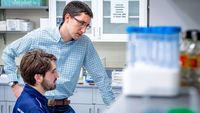
Cody Smith has been granted a highly competitive National Institutes of Health Director’s New Innovator Award that will allow him to perform bold research that has the potential to impact a broad area of science.
Scientists tackle potential drug resistance by using new single-cell genetic method

Using a new technique that can identify genetic profiles of individual cells, University of Notre Dame researchers modeled a breast cancer tumor’s potential resistance to a drug, and then identified a drug combination that reversed that resistance.
Notre Dame biologist uncovers causes and possible treatments for catheter infections
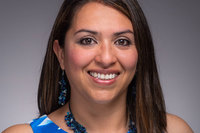
Ana Lidia Flores-Mireles researched one of the word’s largest organisms before a graduate school class sparked her interest in the tiniest ones. She went from studying whales to studying microbes, and is now the Hawk Assistant Professor in the Department of Biological Sciences at the University of Notre Dame.
Fortified salt delivered through a social enterprise proves cost effective for warding off tropical disease, study finds
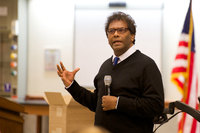
A University of Notre Dame study has shown that a novel social enterprise program to fortify and deliver salt via the marketplace in Haiti has not only been effective at combatting a tropical disease, but is also more cost-effective and financially sustainable than annual mass drug distribution efforts.
Zhang group identifies gene that may make triple-negative breast cancer cells vulnerable to existing drug
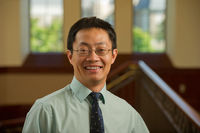
But a new study by Notre Dame researcher Siyuan Zhang and collaborators, published in Nature Communications, shows that an existing, FDA-approved drug that treats other types of breast cancer may work for TNBC.
Study deciphers packaging of tumor ‘cargo,’ leading to better understanding of how cancers spread
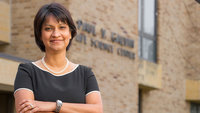
Researchers at the University of Notre Dame have outlined the delivery mechanism tumor cells use to move nucleic acids into small sacs shed from their surfaces — information that is eventually shared with other cells within the tumor, causing the cancer to spread.
In memoriam: Robert A. Schulz, Notre Dame Professor of Biological Sciences
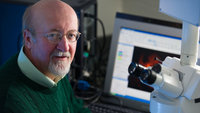
Robert A. Schulz, Notre Dame Professor of Biological Sciences at the University of Notre Dame, died Saturday (July 6). He was 64.
Can we feed 11 billion people while preventing the spread of infectious disease?
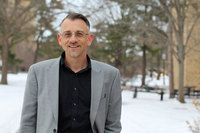
Within the next 80 years, global food demand is expected to increase sharply to meet the needs of a projected world population topping 11 billion. The increase in agriculture will likely influence human infectious diseases, which in turn may affect food production and distribution, according to a review paper by University of Notre Dame biologist Jason Rohr and collaborators.
China's 2014 unprecedented dengue outbreak caused by a "perfect storm" of factors, study shows
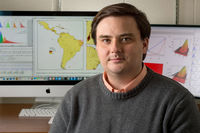
A major outbreak of dengue fever in southern China in 2014 may have been caused by more than just high temperatures, numbers of mosquitoes, or imported cases from Southeast Asia. Despite previous studies that point to these specific reasons for the outbreak that affected almost 40,000 people, a new study from the University of Notre Dame shows there likely were other factors involved as well.
Biologist's indoor-outdoor laboratory will further research into intersection of wildlife and human health

Finding solutions for worldwide shortages propels new University of Notre Dame biology professor Jason Rohr to find unique ways to research some of the most pressing issues. These include food shortages. Energy shortages. Even “shortages” of amphibians because of disease. Rohr, the Ludmilla F., Stephen J., and Robert T. Galla College Professor of Biological Sciences, completes research in areas that span the intersection of wildlife and human health.
Research demonstrates how immunotherapy may be effective for fighting TB
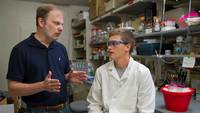
New research from the University of Notre Dame suggests that structures released by the infected cells may be used in tandem with antibiotics to boost the body’s immune system, helping fight off the disease.
Researchers determine how nerve fibers enter spinal cord during early development

New research from Notre Dame could lead to regenerative therapies for people with injuries to their brachial plexus, a group of nerves that starts at the spinal cord and goes into the arm.
Notre Dame researcher honored for outstanding work in aquatic sciences
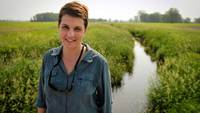
Jennifer Tank, the Galla Professor of Biological Sciences, has been honored with the 2019 Ruth Patrick Award from the Association for the Sciences of Limnology and Oceanography (ASLO).
Zhang lands DOD breast cancer research award

Siyuan Zhang, the Dee Associate Professor of Biological Sciences who is also affiliated with the Harper Cancer Research Institute, landed a nearly $1.1 million Breast Cancer Research Program Breakthrough Award through the Department of Defense in August.
Lu receives Susan G. Komen grant to study how breast cancer spreads

Xin Lu, the John M. and Mary Jo Boler Assistant Professor of biology, was awarded a 2018 Susan G. Komen research grant to identify potential new therapies for treating metastatic breast cancer.
Undergraduate research highlighted at 12th annual COS-JAM
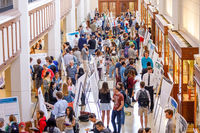
From poster sessions to presentations, the College of Science Joint Annual Meeting (COS-JAM) on May 4, 2018, showcased the depth of undergraduate research completed by students within the fields of science and engineering. Eighty-nine students presented posters and 23 gave oral presentations during sessions held in the Jordan Hall of Science. Hundreds of students, professors and others met with the presenters to learn more about their work. Presenting to peers at COS-JAM is a low-stakes way for students to develop experience sharing their research. It is a skill they will use as they advance to graduate school and the workplace. “Scientific communication, like presentations at COS-JAM, is an integral part of research,” said Xuemin Lu, undergraduate research director for the College of Science and assistant teaching professor in the Department of Biological Sciences.
Two College of Science professors in Michiana's 2018 "Forty under 40" class
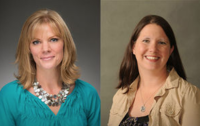
A blend of dedication to the community and a joyful work ethic landed two science professors in the spotlight as they were inducted into the 2018 Michiana Forty under 40 class. The inductees from the College of Science were Nancy Michael, assistant teaching professor and director of undergraduate studies, Neuroscience and Behavior; and Jenifer Prosperi, adjunct assistant professor in the Department of Biological Sciences at Notre Dame and member of Harper Cancer Research Institute, as well as assistant professor of biochemistry and molecular biology, Indiana University School of Medicine–South Bend. A third inductee from Notre Dame was Regan Jones, the University’s director for military and veterans affairs.
Natural bacterial proteins may prove viable alternatives to antibiotics
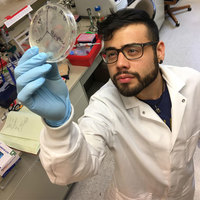
Tiny proteins found in the genomes of some types of bacteria are effective weapons against a wide range of other bacteria, opening the door for the development of new therapies in the age of antibiotic resistance, according to new research at the University of Notre Dame.
Researchers discover novel mechanism linking changes in mitochondria to cancer cell death
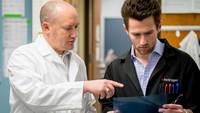
To stop the spread of cancer, cancer cells must die. Unfortunately, many types of cancer cells seem to use innate mechanisms that block cancer cell death, therefore allowing the cancer to metastasize. While seeking to further understand cancer cell death, researchers at the University of Notre Dame discovered that the activation of a specific enzyme may help suppress the spread of tumors. The findings, published in Nature Cell Biology, demonstrate that the enzyme RIPK1 decreases the number of mitochondria in a cell. This loss of mitochondria leads to oxidative stress that can potentially kill cancer cells, though researchers speculate the cancer cells could find ways to shut down this effect.
Top researchers and graduate students come together during first Life Sciences Symposium
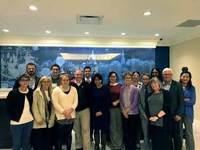
Notre Dame’s first Life Sciences Symposium brought together leading biomedical researchers for a day of lectures and poster presentations, drawing about 200 students and scientists from across the area. The event, “Bridging the Gap from Bench to Bedside,” was held Oct. 11, 2017, at the Morris Inn and was organized and hosted by students in the Department of Biological Sciences graduate program. Attendees came from Indiana, Michigan, Illinois, and Ohio to hear researchers present topics from stem cells in cancer to neurobiology and regeneration.
Undergraduate students spend summer conducting cancer research at MD Anderson
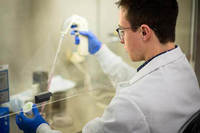
Research took precedence over relaxation for several College of Science students this summer who spent 10 weeks completing undergraduate research projects at MD Anderson Cancer Center in Houston, Texas. Two students from biological sciences, Colin Sheehan and Shane Davitt, were among the participants. The University of Notre Dame Summer Undergraduate Research Program at MD Anderson is a competitive program designed for outstanding and highly motivated undergraduate students interested in pursuing a career in cancer research. Students participated in various types of research in different labs, attended lectures and presentations, and collaborated with others as they fostered their interest in a research career path.
Summer Undergraduate Research Fellowship students thankful for new experiences
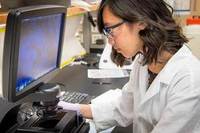
From studying Fragile X Syndrome to understanding algorithms for artificial intelligence, 47 students participated in a summer’s worth of research, thanks to the College of Science Summer Undergraduate Research Fellowships (SURF). The program is made possible through donors and in collaboration with the Center of Undergraduate Scholarly Engagement, Indiana University School of Medicine–South Bend, and the Glynn Family Honors program.
Biological Sciences faculty win awards for teaching and advising
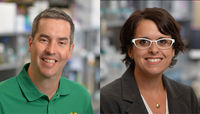
David J. Veselik, director of undergraduate studies and associate teaching professor in the department of biological sciences, was one of three recipients of the Dockweiler Awards for the 2016–2017 academic year. Veselik is the coordinator for the cell biology laboratory, as well as the biology club advisor. He has taught upper level cell biology labs and lectures. With his guidance, students have participated in several initiatives, including networking with the career center, vertical peer mentoring, lab shadowing and alumni mentoring.